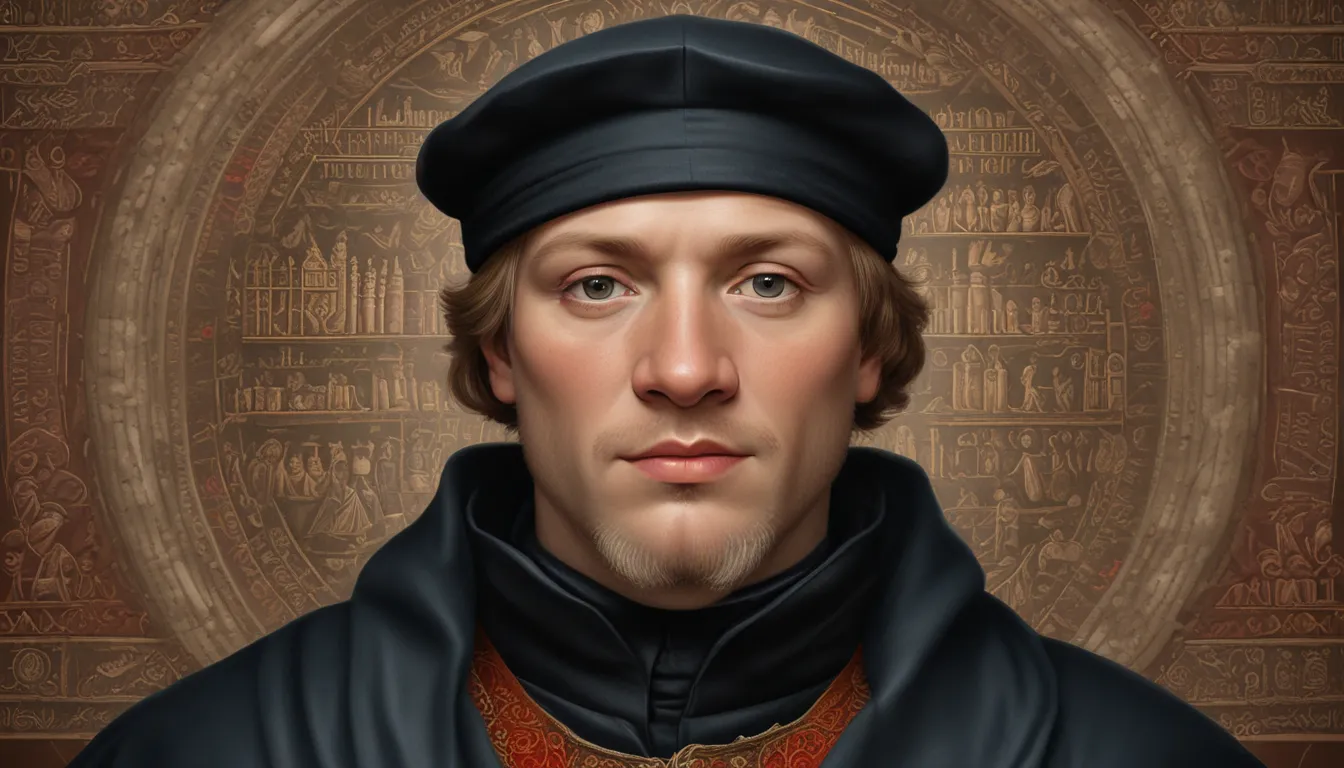The images in our articles may not match the content exactly. They are used to grab your attention, not to show the exact details in the text. The images complement the text but do not replace it.
Welcome to a fascinating journey into the life and impact of Martin Luther, a towering figure in history whose actions and ideas reshaped the religious, social, and political landscapes of the 16th century. While many are familiar with his pivotal role in sparking the Protestant Reformation with his famous Ninety-Five Theses, there are numerous lesser-known facts and aspects of Luther’s life that will leave you in awe. Join us as we unravel the captivating details of this iconic figure’s life, shedding light on his remarkable legacy.
The Path to Reform
Martin Luther’s journey towards becoming a key figure in the Protestant Reformation was marked by pivotal moments that shaped his beliefs and actions. Born on November 10, 1483, in Eisleben, Germany, Luther showed early promise and intelligence, qualities that would propel him towards a path of theological excellence and reform. At the age of 22, he made a fateful decision to enter the Augustinian monastery, influenced by a harrowing experience during a thunderstorm that led him to vow to become a monk if he survived.
Luther’s impact extended beyond the walls of the monastery as he embarked on a mission to make the scriptures accessible to the common people. Recognizing the importance of translating the Bible into the vernacular language of the German populace, Luther dedicated himself to this monumental task, ensuring that the Word of God was within reach of all who sought spiritual enlightenment.
Embracing Revolutionary Ideas
Central to Luther’s teachings was the concept of justification by faith alone, a stark departure from the Catholic Church’s doctrines on salvation through works and indulgences. His beliefs ignited a firestorm of controversy that culminated in his famous “Here I Stand” speech at the Diet of Worms in 1521, where he boldly proclaimed his unwavering convictions in the face of opposition.
Luther’s personal life was also marked by defiance of societal norms when he married Katharina von Bora, a former nun, challenging traditional views on celibacy and setting an example of marital partnership that transcended convention.
A Man of Many Talents
In addition to his theological prowess, Martin Luther was a prolific writer and composer whose works left an indelible mark on history. Composing numerous hymns, including the iconic “A Mighty Fortress Is Our God,” Luther used music as a powerful tool to spread the message of the Protestant Reformation and inspire worshippers with his stirring lyrics.
Despite battling various health issues throughout his life, including kidney stones, heart problems, and depression, Luther’s tireless dedication to his cause never wavered. His writings, particularly his treatises on faith and grace, became foundational texts of the Protestant movement, shaping the theological landscape for generations to come.
Beyond Religion: A Lasting Legacy
While Martin Luther is primarily remembered for his religious reforms, his influence transcended the realm of faith, impacting education, language, and social reforms in Europe during the Renaissance. A staunch advocate for the education of both boys and girls, Luther believed in equal access to learning for all children, regardless of gender, a progressive stance that reflected his commitment to equality and empowerment.
However, Luther’s bold ideas also sparked religious conflicts and wars as nations and individuals grappled with the seismic shifts brought about by the Reformation. Despite the turmoil and unrest that ensued, Luther’s legacy endures to this day, shaping the modern world and influencing the course of history.
Conclusion: A Legacy of Courage and Conviction
In conclusion, Martin Luther’s life is a testament to the power of one individual to challenge authority, advocate for change, and leave a lasting impact on the world. From his stand against the Catholic Church to his advocacy for religious freedom and individual interpretation of scriptures, Luther’s legacy continues to resonate with generations of believers and thinkers.
As we reflect on the remarkable life of Martin Luther, we are reminded of the importance of standing up for our beliefs, even in the face of adversity, and the transformative impact that a single voice can have on the course of history. Let us draw inspiration from Luther’s courage, conviction, and unwavering commitment to truth as we navigate our own journeys of discovery and enlightenment.
FAQs: Exploring the Legacy of Martin Luther
-
Who was Martin Luther?
Martin Luther was a German theologian and the primary catalyst behind the Protestant Reformation in the 16th century. -
What were the 95 Theses?
The 95 Theses were a list of arguments against various practices of the Catholic Church, particularly the sale of indulgences, posted by Martin Luther on October 31, 1517. -
How did Martin Luther influence the Protestant Reformation?
Martin Luther’s writings, teachings, and actions led to a significant break from the Catholic Church and the establishment of Protestantism as a separate branch of Christianity. -
What is the significance of Martin Luther translating the Bible into German?
By translating the Bible into German, Martin Luther made it accessible to the common people, enabling them to read and interpret the scriptures for themselves. -
How did Martin Luther’s beliefs differ from the Catholic Church?
Martin Luther rejected certain key doctrines of the Catholic Church, such as the authority of the Pope and the concept of salvation through good works, emphasizing personal faith and the grace of God. -
What is Martin Luther’s lasting legacy?
Martin Luther’s legacy includes the establishment of Protestantism, the promotion of religious freedom, and the championing of individual interpretation of scriptures. -
How did Martin Luther’s actions impact the world?
Martin Luther’s actions ignited a religious and social revolution that challenged traditional authority, encouraged critical thinking, and paved the way for significant religious and societal reforms. -
Were there any consequences for Martin Luther’s actions?
Yes, Martin Luther faced excommunication from the Catholic Church, but his teachings and ideas continued to gain followers and influence across Europe. -
How can Martin Luther’s teachings be relevant today?
Martin Luther’s teachings serve as a reminder of the importance of questioning authority, seeking truth, and advocating for religious freedom and individual rights. -
What can we learn from Martin Luther?
Martin Luther’s story teaches us the power of standing up for what we believe in, even in the face of adversity, and the potential impact that one individual’s voice can have on the world.
In conclusion, Martin Luther’s life is a powerful reminder of the impact that one individual can have on the course of history. His legacy continues to inspire and challenge us to question authority, seek truth, and advocate for change. Let us carry forward his spirit of courage, conviction, and unwavering belief in our own quests for enlightenment and transformation.






